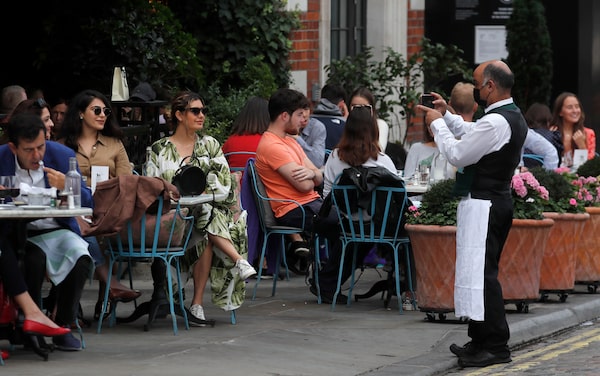
A waiter takes a photo in a restaurant in Covent Garden in London on Sept. 22, 2020.Frank Augstein/The Associated Press
British Prime Minister Boris Johnson has ordered pubs to close early and people to work from home as much as possible for the next six months as the government grapples with an alarming increase in COVID-19 cases.
“We’ve reached a perilous turning point,” Mr. Johnson told the House of Commons on Tuesday. “We’re acting on the principle that a stitch in time saves nine.”
The number of confirmed COVID-19 cases across Britain has quadrupled over the past month to more than 4,000 a day. Hospital admissions have also doubled in two weeks and the country’s top health officials said on Monday that without any action, Britain was on course to see 50,000 cases a day by mid-October and 200 daily deaths in November. They added that Britain was on the same trajectory as Spain and France, where the rates of infection are now among the highest in Europe.
Mr. Johnson has been under increasing pressure to address the sudden surge, and on Tuesday he outlined a series of new restrictions. They included ordering pubs and restaurants to close at 10 p.m. as of Thursday, and instructing office workers to work from home whenever possible. The number of people allowed to attend weddings has been cut to 15 from 30, and pilot projects that would have allowed some spectators into sports events have been cancelled. Penalties for anyone breaking the rules have also been increased.
Schools and universities will remain open, along with all shops and workplaces, so long as they follow COVID-19 guidelines.
The Prime Minister said the new measures will remain in place for six months, but they could be lifted earlier if the infection rate subsided. “For the time being, this virus is a fact of our lives,” Mr. Johnson said. However, he also wouldn’t rule out further action if case numbers continued to climb.
The tougher restrictions marked a sharp departure for Mr. Johnson and other ministers who have been eager to kick-start the country’s sagging economy. During the summer, Mr. Johnson encouraged people to return to work and pubs, and the government introduced a popular “Eat Out to Help Out” scheme, which subsidized millions of restaurant meals in August.He also hoped to tackle local outbreaks of the virus with regional measures, and large parts of the country are already under stricter physical-distancing rules. For example, in much of Manchester, Birmingham, Liverpool and Belfast, pubs have closed early and there has been a ban on people socializing outside of their household.
Even as he introduced the new national restrictions on Tuesday, Mr. Johnson seemed keen to highlight that he was not imposing a lockdown and that most businesses would continue to operate. “We are taking decisive and appropriate steps to balance saving lives and protecting jobs and livelihoods,” he told the Commons.
But the government faced immediate criticism for its confusing messaging and lack of support for business that will be affected by the new restrictions. “This is a time of national crisis, and we need clear leadership,” Labour Leader Sir Keir Starmer said.
Mr. Starmer called on the government to extend its furlough program, which covers up to 80 per cent of the wages of workers who have been laid off because of the pandemic. The program is set to expire next month, and Mr. Johnson has indicated it will not continue. On Tuesday, he promised further support for workers and businesses affected by the pandemic, but provided no details.
Several business groups said the new measures will cripple the hospitality sector, which had yet to recover from the three-month lockdown last spring. The new restrictions will be “disastrous for pubs” and lead to “many pub closures and the loss of many thousands of jobs,” a group of 200 pub owners said in a letter to Mr. Johnson on Tuesday.
Around 100 sports groups, including soccer’s Premier League, have also urged the government to provide some help to struggling teams and grassroots sports bodies. “We are united in our concern that at a time when our role should be central to the nation’s recovery, the future of the sector is perilous,” the group said in a letter to Mr. Johnson. Many smaller soccer leagues and clubs rely heavily on ticket sales, and they are struggling to survive. They had been banking on a return of some fans next month, but Mr. Johnson delayed plans to reopen stadiums on a limited basis.
Mr. Johnson said the government was working “to identify ways in which we can keep these clubs going, [how] we can support sport at all levels throughout the pandemic”.
Medical experts largely welcomed the new restrictions, but some said they didn’t go far enough. “The 10 p.m. curfew will likely have little or no impact,” said Dr. Michael Head, senior research fellow in global health at the University of Southampton. “A far better approach would be to shut all pubs and restaurants, and properly compensate businesses and employees for the loss of income.”
Linda Bauld, a professor of public health at the University of Edinburgh, said the measures were not as stringent as expected. “What is worrying, however, is that they will be accompanied by sticks but no carrots,” she said. “A punitive approach, if not accompanied by adequate support, risks further declines in public support for the U.K. government. It also risks rising levels of non-compliance.”
Our Morning Update and Evening Update newsletters are written by Globe editors, giving you a concise summary of the day’s most important headlines. Sign up today.
 Paul Waldie
Paul Waldie